daftandbarmy
Army.ca Dinosaur
- Reaction score
- 26,364
- Points
- 1,160
Well done! Now let's see of they can stick to their guns....

Well done! Now let's see of they can stick to their guns....
G7 agree to 'starve the Russian war machine'

(Colin) Powell was born in New York City in 1937 to parents who immigrated from Jamaica.
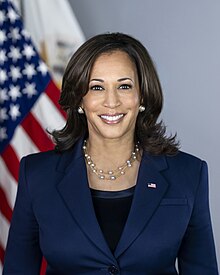
Kamala Devi Harris was born in Oakland, California,[9] on October 20, 1964.[10] Her mother, Shyamala Gopalan, was a Tamil Indian biologist, whose work on the progesterone receptor gene stimulated advances in breast cancer research.[11] She came to the United States from India in 1958, as a 19-year-old graduate student in nutrition and endocrinology at the University of California, Berkeley,[12][13] and received her PhD in 1964.[14] Kamala Harris's Jamaican American father, Donald J. Harris, is of African and Irish ancestry.[15] He is a Stanford University professor of economics (emeritus) who arrived in the United States from British Jamaica in 1961, for graduate study at UC Berkeley, receiving a PhD in economics in 1966.[16][17] Donald Harris met his future wife Shyamala Gopalan at a college club for African-American students (though Indian, Gopalan was allowed to join).[18][19]

(Nikki) Haley was born Nimarata Nikki Randhawa on January 20, 1972, at Bamberg County Hospital in Bamberg, South Carolina,[1][2][9] to immigrant Sikh parents from Punjab, India.[10][11] Her father, Ajit Singh Randhawa, and her mother, Raj Kaur Randhawa, immigrated to the United States from Amritsar District, Punjab, India.[12] Her father was formerly a professor at Punjab Agricultural University, and her mother received her law degree from the University of Delhi.[13] Haley was known by her middle name, Nikki, a Punjabi name meaning "little one", from her earliest years.[14]
Haley's parents moved to Canada after her father received a scholarship offer from the University of British Columbia. When her father received his PhD in 1969, he moved his family to South Carolina to be a professor at Voorhees College, a historically black institution.[15]
Her mother, Raj Randhawa, earned a master's degree in education and taught for seven years in Bamberg public schools. In 1976 she started a popular clothing boutique, Exotica International. It closed in 2008.[13]
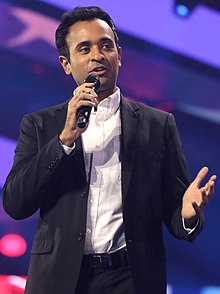
(Vivek) Ramaswamy was born in 1985 in Cincinnati, Ohio, and raised there.[1][2] His parents emigrated from Vadakkencherry, Palakkad, Kerala, India.[3] His father graduated from the regional engineering college in Kerala and worked for General Electric as an engineer and patent attorney, while his mother graduated from Mysore Medical College and worked as a geriatric psychiatrist.[1][4]
Ramaswamy graduated in 2003 from St. Xavier High School, a Jesuit high school in Cincinnati.[5][6] He was class valedictorian and had been a nationally ranked junior tennis player.[1]
In 2007, Ramaswamy graduated from Harvard College with a Bachelor of Arts, summa cum laude, in biology and membership in Phi Beta Kappa. He wrote his senior thesis on the ethical questions raised by creating human-animal chimeras. An abstract of his thesis was published in The New York Times and The Boston Globe in 2007.[7] In 2011, Ramaswamy was awarded a post-graduate fellowship by the The Paul & Daisy Soros Fellowships for New Americans.[8] In 2013, he received a J.D. from Yale Law School.[7]
In 2007, Ramaswamy and Travis May co-founded Campus Venture Network, a technology company that provided software and networking resources to university entrepreneurs.[9] The company was acquired in 2009 by the Ewing Marion Kauffman Foundation.[10]
From 2007 to 2014, Ramaswamy worked at QVT Financial, where he was a partner and co-managed the firm's biotech portfolio while simultaneously attending Yale Law School from 2010 to 2013.[11][12] Ramaswamy served on the Ohio COVID-19 Response Team.[8]
In 2014, Ramaswamy founded the pharmaceutical company Roivant Sciences, which focuses on applying technology to drug development, serving as CEO until 2021.[13] He appeared on the cover of Forbes magazine in 2015 for his work in drug development.[14]
The story was about Ramaswamy raising $360 million for the Roivant subsidiary Axovant Sciences in an attempt to save an Alzheimer's drug that had failed at GlaxoSmith Kline.[14] In 2017, the drug also failed at Axovant. Axovant had a market value of $276 million as of June 2018.[1][15] In 2020, Ramaswamy co-founded Chapter Medicare, a Medicare navigation platform.[16] In early 2021, Ramaswamy stepped down as CEO of Roivant Sciences.[13]
In 2020, Ramaswamy supported RSV's establishment of Roivant Social Ventures, which has been described as an environmental, social, and governance (ESG) initiative. RSV was created to "generate substantial social returns and reinvest financial returns to drive long-term impact".
Issue areas of interest to RSV include increased diversity in clinical trials and creating diversity, equity and inclusion (DEI) opportunities in the biopharmaceutical industry. RSV CEO Lindsay Androski has said that Ramaswamy approved of the creation of RSV.[17]

Elon Reeve Musk was born on June 28, 1971, in Pretoria, one of South Africa's capital cities.[8][9] Musk has British and Pennsylvania Dutch ancestry.[10][11] His mother is Maye Musk (née Haldeman), a model and dietitian born in Saskatchewan, Canada, and raised in South Africa.[12][13][14] His father, Errol Musk, is a South African electromechanical engineer, pilot, sailor, consultant, and property developer, who partly owned a Zambian emerald mine near Lake Tanganyika.[15][16][17][18] Musk has a younger brother, Kimbal, and a younger sister, Tosca.[14][19]
Musk's family was wealthy during his youth.[18] His father was elected to the Pretoria City Council as a representative of the anti-apartheid Progressive Party and has said that his children shared their father's dislike of apartheid.[8] His maternal grandfather, Joshua Haldeman, was an adventurous American-born Canadian who took his family on record-breaking journeys to Africa and Australia in a single-engine Bellanca airplane.[20][21][22] After his parents divorced in 1980, Musk chose to mostly live with his father.[10] Musk regretted his decision and has become estranged from his father.[23] He has a paternal half-sister and a half-brother.[20][24]





“Be it so. This burning of widows is your custom; prepare the funeral pile. But my nation has also a custom. When men burn women alive we hang them, and confiscate all their property. My carpenters shall therefore erect gibbets on which to hang all concerned when the widow is consumed. Let us all act according to national customs.[To Hindu priests complaining to him about the prohibition of Sati religious funeral practice of burning widows alive on her husband’s funeral pyre.]”
Charles James Napier was the eldest son of Colonel George Napier, and his second wife, Lady Sarah Lennox, with this being the second marriage for both parties. Lady Sarah was the great-granddaughter of King Charles II. Napier was born at the Whitehall Palace in London.
When he was only three years old his father took up an administrative post in Dublin, moving his family to live in Celbridge in County Kildare, Ireland, within walking distance of Lady Sarah's sister, Lady Louisa Conolly. His early education was at the local school in Celbridge. At the age of twelve, he joined the 33rd Infantry Regiment of the British Army in January 1794, but quickly transferred to the 89th and did not immediately take up his commission, but returned to school in Ireland.[2] In 1799, aged 17, he took up active service in the army as aide-de-camp to Sir James Duff.[3]
Robert Clive, 1st Baron Clive, KB, FRS (29 September 1725 – 22 November 1774), also known as Clive of India,[1][2][3] was the first British Governor of the Bengal Presidency. Clive has been widely credited for laying the foundation of the British East India Company (EIC) rule in Bengal.[4][5][6][7][8][9] He began as a writer (the term used then in India for an office clerk) for the EIC in 1744 and established Company rule in Bengal by winning the Battle of Plassey in 1757.[10] In return for supporting the Nawab Mir Jafar as ruler of Bengal, Clive was granted a jagir of £30,000 (equivalent to £4,300,000 in 2021) per year which was the rent the EIC would otherwise pay to the Nawab for their tax-farming concession. When Clive left India in January 1767 he had a fortune of £180,000 (equivalent to £25,700,000 in 2021) which he remitted through the Dutch East India Company.[11][12]
Robert Clive was born at Styche, the Clive family estate, near Market Drayton in Shropshire, on 29 September 1725 to Richard Clive and Rebecca (née Gaskell) Clive.[15] The family had held the small estate since the time of Henry VII and had a lengthy history of public service: members of the family included a Chancellor of the Exchequer of Ireland under Henry VIII, and a member of the Long Parliament. Robert's father, who supplemented the estate's modest income by practising as a lawyer, also served in Parliament for many years, representing Montgomeryshire.[16] Robert was their eldest son of thirteen children; he had seven sisters and five brothers, six of whom died in infancy.[17]
Sir Thomas Stamford Bingley Raffles FRS FRAS (5 July 1781 – 5 July 1826)[1][2] was a British colonial official who served as one of the British Governors of the Dutch East Indies between 1811 and 1816, and Lieutenant-Governor of Bencoolen between 1818 and 1824.
Raffles was heavily involved in the capture of the Indonesian island of Java from the Dutch during the Napoleonic Wars. The running of day-to-day operations on Singapore was mostly done by William Farquhar,[3] but Raffles was the one who got all the credit. He also wrote The History of Java (1817).[4
Thomas Stamford Bingley Raffles was born on 5 July 1781 on board the ship Ann, off the coast of Port Morant, Jamaica,[2] to Captain Benjamin Raffles (1739, London – 23 November 1811, Deptford) and Anne Raffles (née Lyde) (1755 – 8 February 1824, London).[1] Benjamin served as a ship master for various ships engaged in the direct trade between England and the West Indies. Although some biographers have suggested that Benjamin was involved in the slave trade, modern historians have refuted such claims. When Benjamin ended his involvement in the West India trade in 1800, it caused his family considerable hardship.[5]
The little money the family had went into sending the young Raffles to the Mansion House Academy, Hammersmith, a moderately priced boarding school, offering Latin, Greek, French, arithmetic, bookkeeping and geography, that specialised in preparing boys for clerkships or the army.[6] In 1795, at the age of 14, Raffles started working as a clerk in London for the British East India Company, the trading company that shaped many of Britain's overseas conquests.
William Jardine (24 February 1784 – 27 February 1843) was a Scottish physician, opium merchant and trader who co-founded the Hong Kong based conglomerate Jardine, Matheson & Co. Following his return to England from the Far East, between 1841 and 1843, he was Member of Parliament for Ashburton representing the Whig party.
Educated in medicine at the University of Edinburgh, in 1802 Jardine obtained a diploma from the Royal College of Surgeons of Edinburgh. The next year, he became a surgeon's mate aboard the Brunswick belonging to the East India Company, and set sail for India. In May 1817, he abandoned medicine for trade.
Jardine was a resident in China from 1820 to 1839. His early success in Canton as a commercial agent for opium merchants in India led to his admission in 1825 as a partner in Magniac & Co., and by 1826 he controlled that firm's Canton operations.
Sir James Nicolas Sutherland Matheson, 1st Baronet, FRS (17 November 1796 – 31 December 1878), was a Scottish Tai-Pan. Born in Shiness, Lairg, Sutherland, Scotland, he was the son of Captain Donald Matheson.[1] He attended Edinburgh's Royal High School and the University of Edinburgh. He and William Jardine went on to co-found the Hong Kong-based trading conglomerate Jardine Matheson & Co. that became today's Jardine Matheson Holdings.
After leaving university, Matheson spent two years in a London agency house before departing for Calcutta, India and a position in his uncle's trading firm, Mackintosh & Co.[2]
In 1807, Matheson was entrusted by his uncle with a letter to be delivered to the captain of a soon-to-depart British vessel. He forgot to deliver the missive and the vessel sailed without it. Incensed at his nephew's negligence, the uncle suggested that young James might be better off back in Britain. He took his uncle at his word and went to engage a passage back home. However, a chance encounter with an old sea captain instead led to Matheson departing for Canton (Guangzhou).[citation needed]
Matheson first met William Jardine in Bombay in 1820.[3] The two men later formed a partnership which also included Hollingworth Magniac and Daniel Beale. At first the new firm dealt only with trade between Canton, Bombay and Calcutta, at that time called the "country trade" but later extended their business to London.
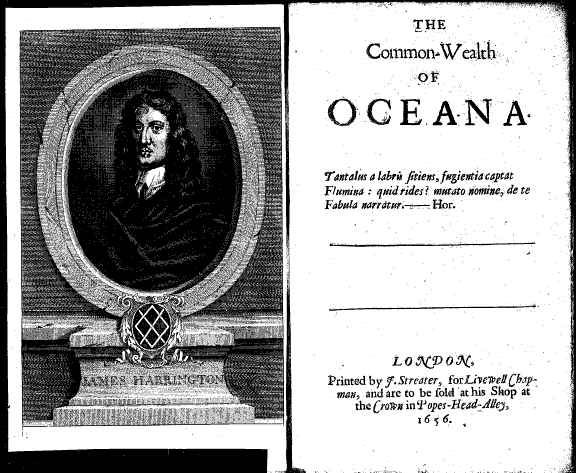
Hakluyt prepared an English translation of Dutch jurist Hugo Grotius' Mare Liberum (1609),[22] a treatise that sought to demonstrate that the Dutch had the right to trade freely in the East Indies, contrary to Spanish and Portuguese claims of sovereignty over the seas,
Helen Thornton has suggested that the translation was commissioned by Thomas Smythe who became treasurer of the Virginia Company in 1609 and was also Governor of the East India Company. In that year, Hakluyt was a consultant to the Company when it was renewing its charter. Grotius' arguments supported England's right to trade in the Indies
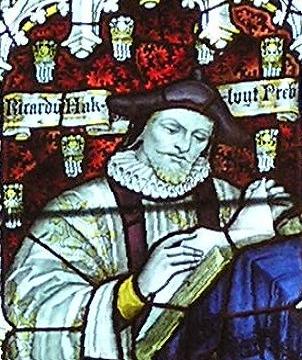

As Neo was told the late twenty century was the pinnacle of civilization.
We are in the twilight.
The anglosphere and the greater part of western civilization is being erased, forgotten, or subverted.
This the end point. We (as in the west) have been so successfully we are in reality destroying ourselves.
The best we can hope for is a slowing down of the car as it races to the cliff.
As Neo was told the late twenty century was the pinnacle of civilization.
We are in the twilight.
The anglosphere and the greater part of western civilization is being erased, forgotten, or subverted.
This the end point. We (as in the west) have been so successfully we are in reality destroying ourselves.
The best we can hope for is a slowing down of the car as it races to the cliff.
"Some hae meat and cannae eat.
Some hae nane and want it.
But we hae meat
And we can eat
Sae let the Lord be thankit."
As a Presbyterian church, the church has no bishops but is rather governed by elders and ministers (collectively called presbyters) sitting in a series of courts. Each congregation is led by a Session. The Sessions in turn are answerable to regional presbyteries (of which the church currently has over 40). The supreme body is the annual General Assembly, which meets each May in Edinburgh
.Each court is convened by the 'moderator'—at the local level of the Session normally the parish minister who is ex officio member and Moderator of the Session. Congregations where there is no minister, or where the minister is incapacitated, may be moderated by a specially trained elder. Presbyteries and the General Assembly elect a moderator each year. The Moderator of the General Assembly serves for the year as the public representative of the church, but beyond that enjoys no special powers or privileges and is in no sense the leader or official spokesperson of the church. At all levels, moderators may be either elders or ministers. Only Moderators of Sessions are obliged to be trained for the role





The Roman Curia (Latin: Romana Curia) comprises the administrative institutions of the Holy See[note 1] and the central body through which the affairs of the Roman Catholic Church are conducted. The Roman Curia is the institution which the Roman Pontiff ordinarily makes use of in the exercise of his supreme pastoral office and universal mission in the world. It is at the service of the Pope,
| THE ROMAN CURIA |
In exercising supreme, full, and immediate power in the universal Church, the Roman pontiff makes use of the departments of the Roman Curia which, therefore, perform their duties in his name and with his authority for the good of the churches and in the service of the sacred pastors. |
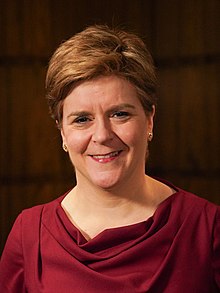

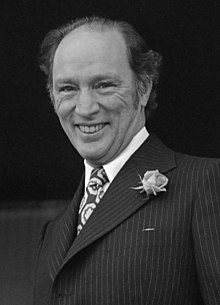


Thomas Clement Douglas was born in 1904 in Camelon, Falkirk, Scotland, the son of Annie (née Clement) and Thomas Douglas, an iron moulder who fought in the Boer War.[1] In 1910, his family emigrated to Canada, where they settled in Winnipeg.[2]
During World War I, the family went back to Glasgow.[4] They returned to Winnipeg in late 1918, in time for Douglas to witness the Winnipeg general strike.[5] From a rooftop vantage point on Main Street, he witnessed the police charging the strikers with clubs and guns, and a streetcar being overturned and set on fire. He also witnessed the Royal Canadian Mounted Police (RCMP) shoot and kill one of the workers. This incident influenced Douglas later in life by cementing his commitment to protect fundamental freedoms in a Bill of Rights when he was premier of Saskatchewan.[6]
In 1924, the 19-year-old Douglas enrolled at Brandon College, a Baptist school affiliated with McMaster University, to finish high school and study theology. During his six years at the college, he was influenced by the Social Gospel movement, which combined Christian principles with social reform. Liberal-minded professors at Brandon encouraged students to question their fundamentalist religious beliefs. Christianity, they suggested, was just as concerned with the pursuit of social justice as it was with the struggle for individual salvation.
Douglas financed his education at Brandon College by conducting Sunday services at several rural churches for 15 dollars a week. A shortage of ordained clergy forced smaller congregations to rely on student ministers. Douglas reported later that he preached sermons advocating social reform and helping the poor:
"[T]he Bible is like a bull fiddle ... you can play almost any tune you want on it."
John Diefenbaker was born on September 18, 1895, in Neustadt, Ontario, to William Thomas Diefenbaker and Mary Florence Diefenbaker, née Bannerman.[1] His father was the son of German immigrants from Adersbach (near Sinsheim) in Baden; Mary Diefenbaker was of Scottish descent and Diefenbaker was Baptist.
In 1906, William claimed a quarter-section, 160 acres (0.65 km2) of undeveloped land near Borden, Saskatchewan.[4] In February 1910, the Diefenbaker family moved to Saskatoon, the site of the University of Saskatchewan. William and Mary Diefenbaker felt that John and his brother Elmer would have greater educational opportunities in Saskatoon.[5]
In a 1977 interview with the CBC, Diefenbaker recalled he saw injustice first-hand in his youth against French Canadians, Indigenous Canadians and the Métis. He said, "From my earliest days, I knew the meaning of discrimination. Many Canadians were virtually second-hand citizens because of their names and racial origin. Indeed, it seemed until the end of World War II that the only first-class Canadians were either of English or French descent. As a youth, l determined to devote myself to assuring that all Canadians, whatever their racial origin, were equal and declared myself to be a sworn enemy of discrimination."[8][9]
After graduating from high school in Saskatoon, in 1912, Diefenbaker entered the University of Saskatchewan.[10] He received his Bachelor of Arts degree in 1915, and his Master of Arts the following year.[11]
After leaving the military in 1917,[13] Diefenbaker returned to Saskatchewan where he resumed his work as an articling student in law. He received his law degree in 1919,[15] the first student to secure three degrees from the University of Saskatchewan.[16] On June 30, 1919, he was called to the bar, and the following day, opened a small practice in the village of Wakaw, Saskatchewan.[15]

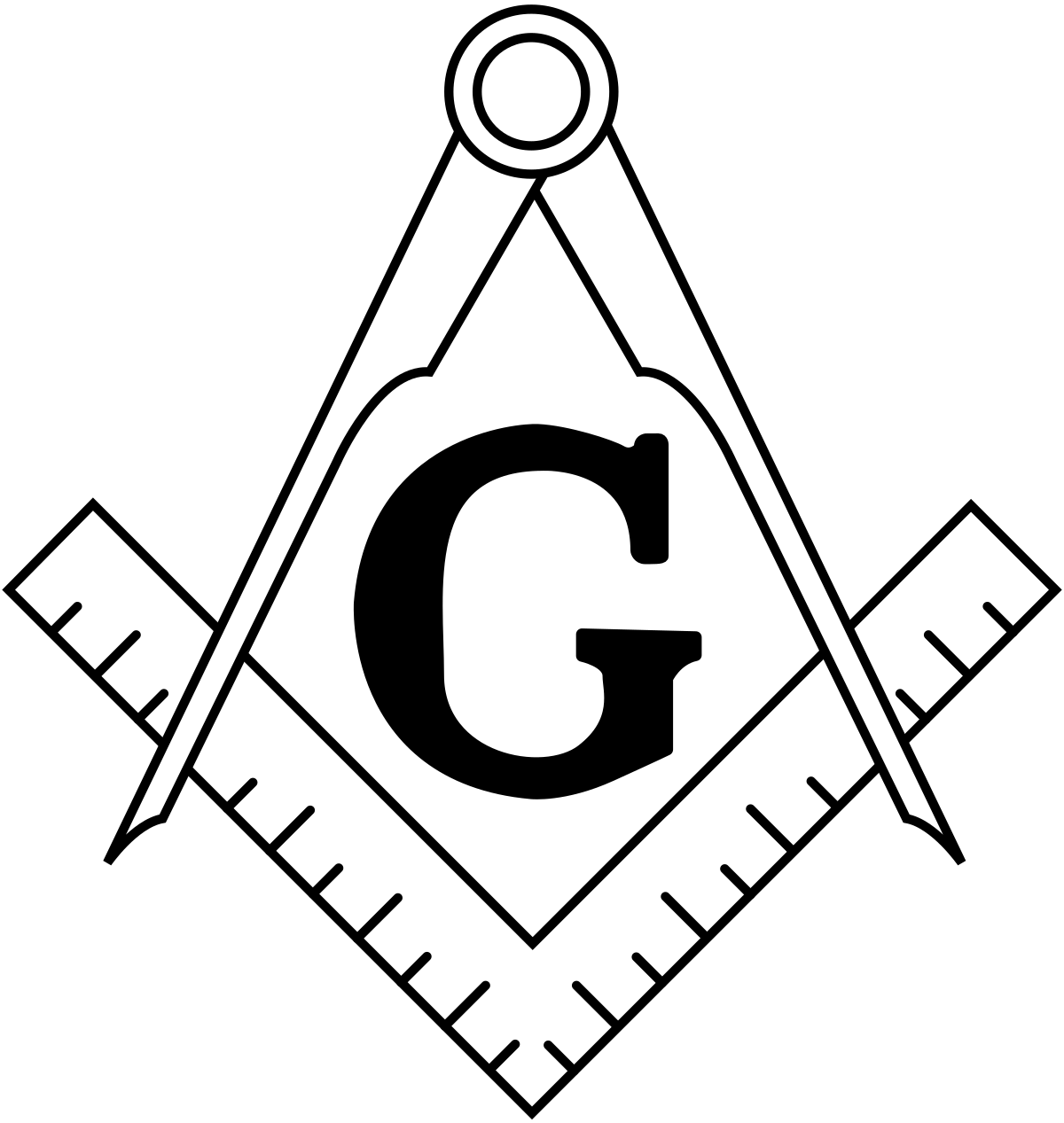
Protestant justices
Most Supreme Court justices have been Protestant Christians. These have included 33 Episcopalians, 18 Presbyterians, nine Unitarians, five Methodists, three Baptists, two Disciples of Christ, and lone representatives of various other denominations.[84] William Rehnquist and William R. Day were the court's only Lutherans. Noah Swayne was a Quaker. Some fifteen Protestant justices did not adhere to a particular denomination. The religious beliefs of James Wilson, one of the earliest justices, have been the subject of some dispute, as there are writings from various points of his life from which it can be argued that he leaned towards Presbyterianism, Anglicanism, Thomism, or Deism; it has been deemed likely that he eventually favored some form of Christianity.[85] Baptist denominations and other evangelical churches have been underrepresented on the court relative to the population of the United States, and entirely unrepresented since the retirement of Methodist Harry Blackmun in 1994.[84] Conversely, mainline Protestant churches historically were overrepresented.[19]
Following the retirement of John Paul Stevens in June 2010, the court had an entirely non-Protestant composition for the first time in its history.[86][87] Neil Gorsuch was the first member of a mainline Protestant denomination to sit on the court since Stevens' retirement.[88][h] Ketanji Brown Jackson is a non-denominational Protestant.[93][94]: 1:49:39
Catholic justices
Roger B. Taney, the first Catholic Justice
The first Catholic justice, Roger B. Taney, was appointed chief justice in 1836 by Andrew Jackson. The second, Edward Douglass White, was appointed as an associate justice in 1894, but also went on to become chief justice. Joseph McKenna was appointed in 1898, placing two Catholics on the court until White's death in 1921. This period marked the beginning of an inconsistently observed "tradition" of having a "Catholic seat" on the court.[95]
...
In contrast to historical patterns, the court has gone from having a "Catholic seat" to being what some have characterized as a "Catholic court". The reasons for that are subject to debate.[100] The fact that most recent Catholic appointees were also ideologically conservative has led some partisan critics to derisively refer to the court as "a Catholic boys club".[101] However in May 2009, President Barack Obama nominated a Catholic woman, Sonia Sotomayor, to replace retiring Justice David Souter.[102] Her confirmation raised the number of Catholics on the court to six, compared to three non-Catholics. With Antonin Scalia's death in February 2016, the number of Catholic justices went back to five. Scalia's replacement, Neil Gorsuch, appointed in 2017, was raised Catholic but attends and is a member of an Episcopal church; it is unclear if he identifies as a Catholic as well as belonging to the Episcopal Church.[82] Following Anthony Kennedy's retirement in July 2018, the number of Catholic justices remained unchanged as he was succeeded by Catholic Brett Kavanaugh. In September 2020, following the death of Ruth Bader Ginsburg, Donald Trump nominated another Catholic, Amy Coney Barrett to succeed her.[60]
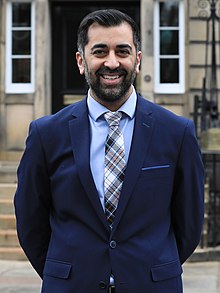
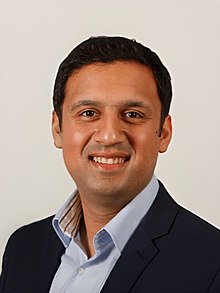
Humza Haroon Yousaf was born in the city of Glasgow on 7 April 1985.[5] He is the son of first-generation immigrants: his father Mian Muzaffar Yousaf was born in Mian Channu, Punjab, Pakistan, and emigrated from the city with his family in the 1960s, eventually working as an accountant.[6]
His paternal grandfather worked in the Singer sewing machine factory in Clydebank in the 1960s.[7] Yousaf's mother, Shaaista Bhutta, was born in Nairobi, Kenya, to a family of Punjabi descent.[8][7] He belongs to the Rajput community.[9] Her family experienced violent racially motivated attacks on several occasions for being seen as taking jobs that "belonged" to Africans, and they later immigrated to Scotland.[10]
Anas Sarwar was born on 14 March 1983 in Glasgow, the youngest of four children. His parents were Perveen Sarwar and Mohammad Sarwar, both Pakistani Muslims.[1][2][3] He attended Hutchesons' Grammar School, a private school in Glasgow, before completing a degree in general dentistry at the University of Glasgow from 2000 to 2005.[4] While a student, he joined marches against the Iraq War.[5] He worked as an NHS dentist in Paisley from 2005 until 2009.[4]
 haidalodge.ca
haidalodge.ca
Donald John Trump was born on June 14, 1946, at Jamaica Hospital in Queens, New York City,[3] the fourth child of Fred Trump, a Bronx-born real estate developer whose parents were German immigrants, and Mary Anne MacLeod Trump, an immigrant from Scotland.
Born in the Outer Hebrides of Scotland, Mary Trump emigrated to the United States in 1930 and became a naturalized citizen in March 1942.[1] She raised five children with her husband and lived in the New York area.[2]
...
Mary Anne MacLeod was born in a pebbledashed croft house owned by her father since 1895 in the village of Tong, Lewis, Scotland.[3][4] Raised in a Scottish Gaelic-speaking household, Mary was the youngest of ten children born to Malcolm (1866–1954) and Mary MacLeod (née Smith; 1867–1963).[5] Her father was a crofter, fisherman and compulsory officer at Mary's school.[4][1][6][7] English was her second language, which she learned at the school she attended until secondary school.[4]
Her paternal grandparents were Alexander MacLeod and Ann MacLeod; her maternal grandparents were Donald Smith and Mary MacAulay. They were from the locations of Vatisker and South Lochs, respectively.[8] Donald died at sea aged 34 when his sailing ship sank, a common fate for men in the region which was dependent on fishing.[9] Some of the family's generations had been forced off their land as part of the Highland Clearances.[10] According to one genealogical account, displaced families in Mary's village lived in "human wretchedness" while nearby farmable land was used as game reserves.[11] Local historians have said properties at the time were "indescribably filthy", and that families in the area lived austere lives as fishers, farmers and peat diggers.[9] The outbreak of World War I weakened the area's economy and male population further.[4]
Arriving in the U.S. with $50 (equivalent to $887 in 2022), MacLeod lived with her older sister Christina Matheson on Long Island and worked as a domestic servant for at least four years.[1][6][7] One of these jobs appears to have been as a nanny for a well-to-do family in a New York suburb
As a 2016 account in Scottish newspaper The National put it, she "started life in America as a dirt-poor servant escaping the even worse poverty of her native land."[6] Having obtained a U.S. Re-entry Permit—only granted to immigrants intending to stay and gain citizenship[6][7]—she returned to Scotland on the SS Cameronia on September 12, 1934
In the mid-1930s, while MacLeod was living with her sister in Queens, she met Fred Trump—already a property developer and builder—at a party;[1][15] on a subsequent visit to Scotland, she told her family that she had met her future husband. They married at the Madison Avenue Presbyterian Church on January 11, 1936,
The family lived in Jamaica, Queens, and later specifically in Jamaica Estates.[2][1] At first, the couple lived in the house of MacLeod's mother-in-law;[18] however, by 1940, the couple, having moved out, had begun an upwardly mobile existence, having taken on a Scottish domestic servant for their own household.
MacLeod raised her children in the Presbyterian faith of her upbringing; on January 20, 2017, incoming U.S. President Donald Trump took his inaugural oath of office using a copy of the Revised Standard Version Bible given to him by his mother in 1955 when he graduated from a Presbyterian Sunday school.[20] MacLeod drove a Rolls-Royce that bore the vanity plates "MMT", the initials of her name, Mary MacLeod Trump.[4]
MacLeod also belonged to several social clubs
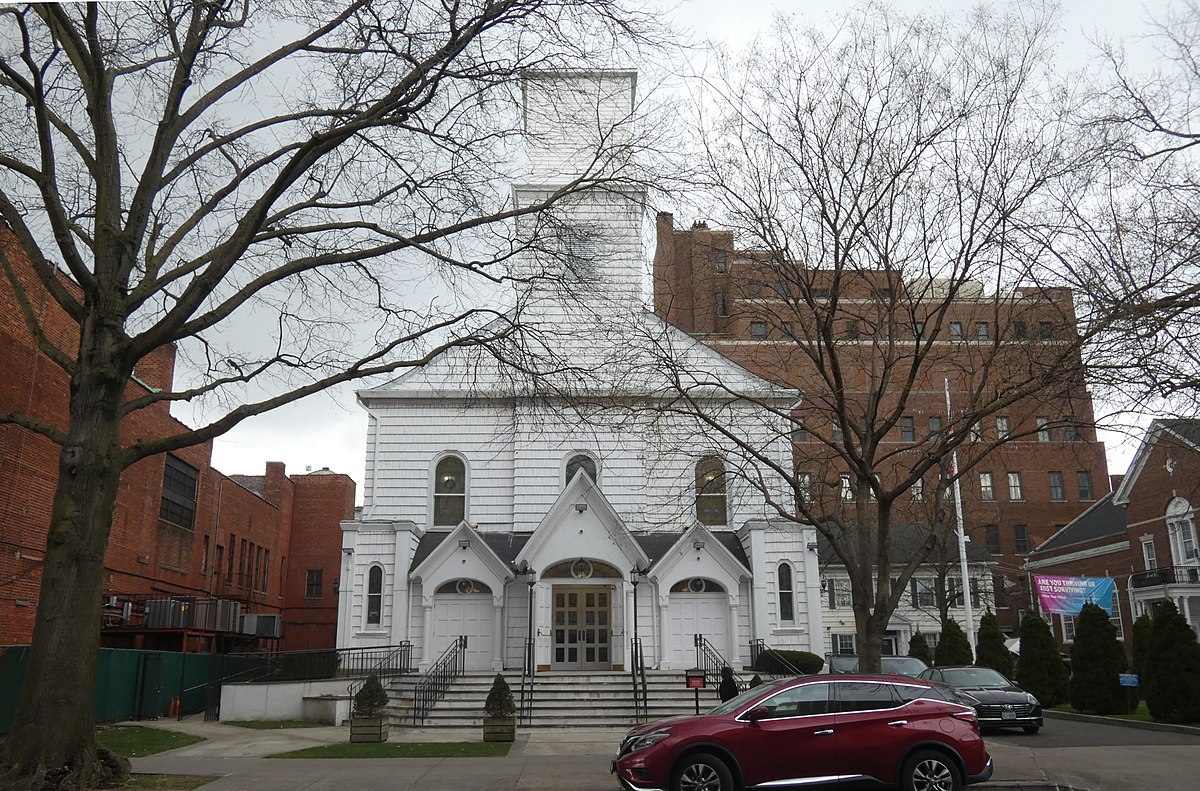
The First Presbyterian Church in Jamaica is located in Jamaica, Queens, a neighborhood of New York City. Organized in 1662, it is the oldest continuously serving Presbyterian church in the United States.[1][2]
The church was first organized in 1662. Most of its founders came from Halifax, West Yorkshire, England.[3] Though there are older churches on Long Island, this congregation has never stopped service.
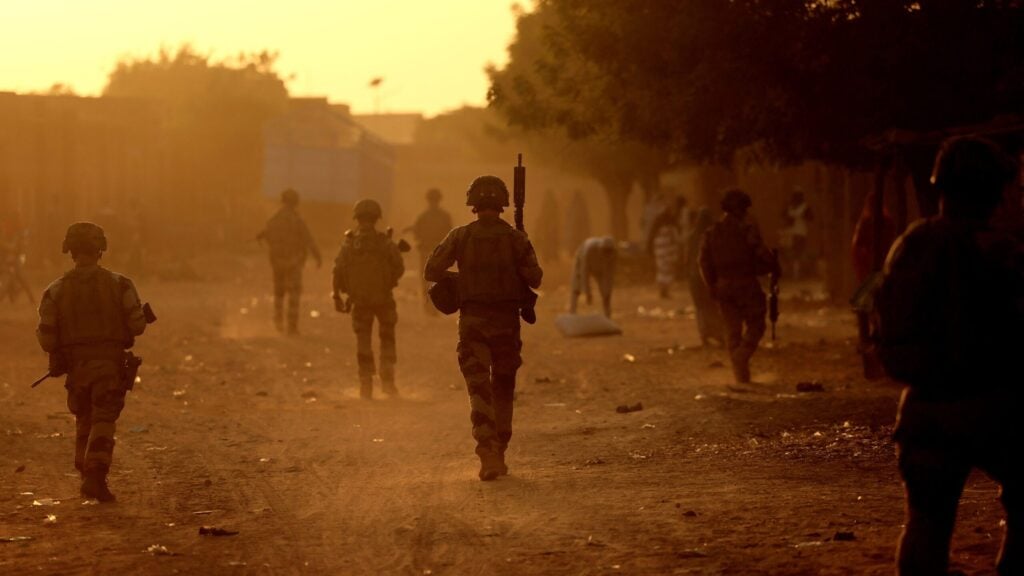

But there again maybe it won't wait....
Honestly?Just for curiosity's sake, How long did it take you to put that post together??

I think each of my rants on this thread took two or three hours apiece but the last one was probably more like six.No. Today?

Not being critical. Just curious. I find myself spending too much time on some posts and afterwards wonder just where the time has gone. It can really get away with me sometimes.I think each of my rants on this thread took two or three hours apiece but the last one was probably more like six.
Somebody just used the expression "fever dream" about one of my recent submissions. I can't argue the toss.
My Therapy. At your expense.Not being critical. Just curious. I find myself spending too much time on some posts and afterwards wonder just where the time has gone. It can really get away with me sometimes.
My wife sees the green screen sometimes - she calls it "Blah! Blahing!"

I sell mine everyday. Let me know todays close of Wikipedia?What would happen if WikipediA banned you? Would you sell your shares?
On the end piece about Tommy Douglas. My Grandfather arrived back about the same time to witness the riots and became a member of the CCF and worked under Tommy Douglas. He was a hard core union man.I think each of my rants on this thread took two or three hours apiece but the last one was probably more like six.
Somebody just used the expression "fever dream" about one of my recent submissions. I can't argue the toss.
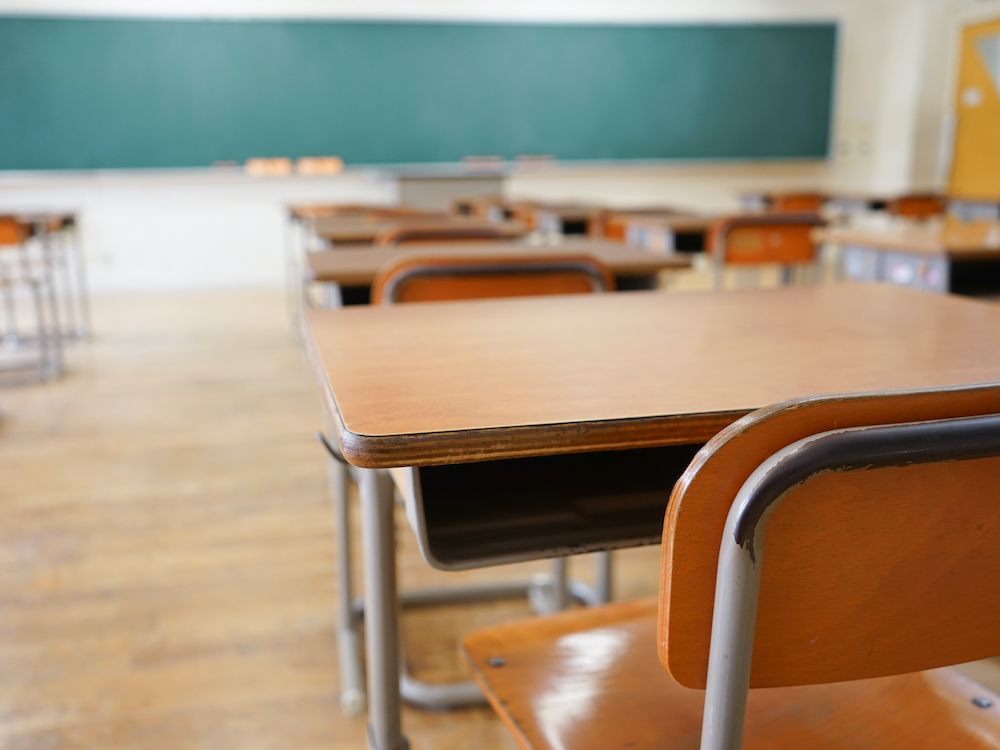
I compared the Woke Left taking over the education system as akin to the wasp that injects it's young onto a unwilling host to raise and nurture it, all while killing the host. The very progressive left generally does not meet the replacement birth rate, so the only way to expand their influence was to take over the education system and infect the young of other groups that do meet the replacement birthrate. When I step away from the effect, I have to admire their strategy.Public schools are turning into grooming centers for the woke left, infecting children with their rhetoric. Education isn't a priority anymore, it's about ensuring kids know what gender they identify as, before they are mature, developed adults. The public education system, like the public healthcare system, is a joke.
